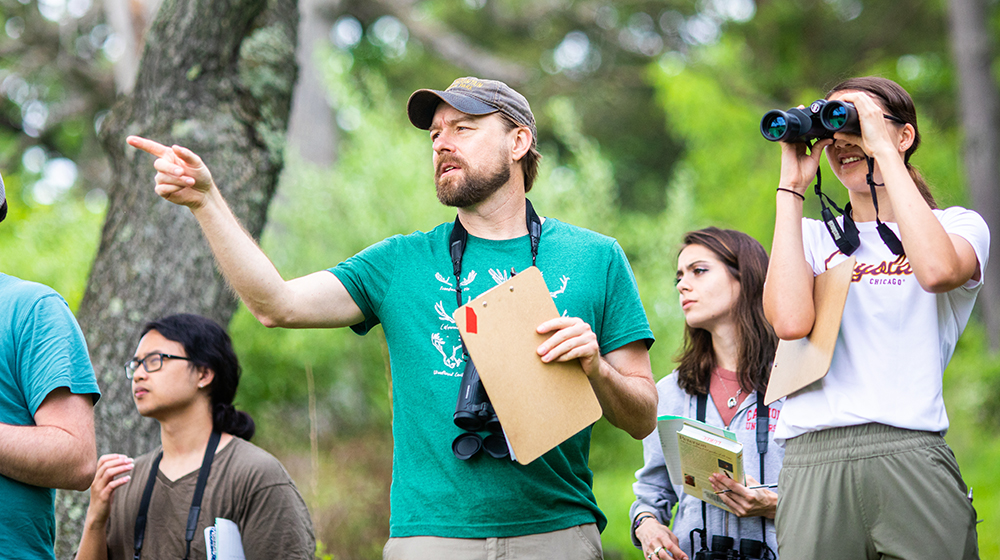Ohsowski Teaching Award
SES Faculty Member Brian Ohsowski Receives Mentoring Award

Brian Ohsowski, PhD, teaches ecology and environmental science courses and helps students develop research skills.
This spring, the Loyola University Center for Engaged Learning, Teaching, and Scholarship (CELTS) presented the Langerback Award for Undergraduate Research Mentoring to Brian Ohsowski, PhD, assistant professor in the School of Environmental Sustainability. The award recognizes Ohsowski’s extraordinary success in supporting and guiding undergraduates in their individual research endeavors.
“I firmly believe that a single person can positively change a student’s life,” said Ohsowski. He said his research mentoring philosophy is rooted in instilling a sense of curiosity and hard work to create scientifically literate global citizens who strive to make a positive impact on ecological systems.
For the past eight years, Ohsowski has been teaching courses focused on restoration ecology and conservation biology. His research investigates practical methods to restore wetland ecosystems in the Great Lakes region. Specifically, he and his collaborators, undergraduate students, and graduate students investigate large-scale management techniques to reduce the invasion of hybrid cattails (Typha x glauca), strategies for mitigating road salts and heavy metals pollution, and biochar production from invasive species biomass. Together, his research group creates opportunities for students to develop into professionals in the field.
Each summer, Ohsowski and his team members travel to the University of Michigan Biological Station (UMBS) to conduct six weeks of fieldwork. The group typically includes research associates, two to four undergraduate students, and a graduate student. Participating students gain valuable experience during long, sometimes strenuous days in the field, often navigating through eight-foot-tall cattails in two feet of water.
“Throughout all of this, most students find an indescribable joy in demanding field work, as demonstrated by their high degree of motivation for learning field skills in the marsh,” said Ohsowski.
Student researchers are immersed in the field and learn about experimental design, field data collection, and wetland plant and bird identification. In the lab, students contribute to the team by analyzing samples collected in the field. Ohsowski noted that after a year or more of mentorship, students grow to become highly prepared scientists who take initiative, work independently, and accomplish tasks with a high degree of professionalism.
“As I walk side–by–side with my students in all aspects of their research, I have a deep sense of pride as I know my students emerge from my lab with a sense of fulfillment and confidence to make their next career step,” he said.
The research mentoring award recognizes Ohsowki’s success in training and inspiring students who will contribute to environmental conservation and restoration. He said his efforts to mentor students and develop future research leaders are his best contributions to solving the climate crisis and biodiversity loss.
This spring, the Loyola University Center for Engaged Learning, Teaching, and Scholarship (CELTS) presented the Langerback Award for Undergraduate Research Mentoring to Brian Ohsowski, PhD, assistant professor in the School of Environmental Sustainability. The award recognizes Ohsowski’s extraordinary success in supporting and guiding undergraduates in their individual research endeavors.
“I firmly believe that a single person can positively change a student’s life,” said Ohsowski. He said his research mentoring philosophy is rooted in instilling a sense of curiosity and hard work to create scientifically literate global citizens who strive to make a positive impact on ecological systems.
For the past eight years, Ohsowski has been teaching courses focused on restoration ecology and conservation biology. His research investigates practical methods to restore wetland ecosystems in the Great Lakes region. Specifically, he and his collaborators, undergraduate students, and graduate students investigate large-scale management techniques to reduce the invasion of hybrid cattails (Typha x glauca), strategies for mitigating road salts and heavy metals pollution, and biochar production from invasive species biomass. Together, his research group creates opportunities for students to develop into professionals in the field.
Each summer, Ohsowski and his team members travel to the University of Michigan Biological Station (UMBS) to conduct six weeks of fieldwork. The group typically includes research associates, two to four undergraduate students, and a graduate student. Participating students gain valuable experience during long, sometimes strenuous days in the field, often navigating through eight-foot-tall cattails in two feet of water.
“Throughout all of this, most students find an indescribable joy in demanding field work, as demonstrated by their high degree of motivation for learning field skills in the marsh,” said Ohsowski.
Student researchers are immersed in the field and learn about experimental design, field data collection, and wetland plant and bird identification. In the lab, students contribute to the team by analyzing samples collected in the field. Ohsowski noted that after a year or more of mentorship, students grow to become highly prepared scientists who take initiative, work independently, and accomplish tasks with a high degree of professionalism.
“As I walk side–by–side with my students in all aspects of their research, I have a deep sense of pride as I know my students emerge from my lab with a sense of fulfillment and confidence to make their next career step,” he said.
The research mentoring award recognizes Ohsowki’s success in training and inspiring students who will contribute to environmental conservation and restoration. He said his efforts to mentor students and develop future research leaders are his best contributions to solving the climate crisis and biodiversity loss.
